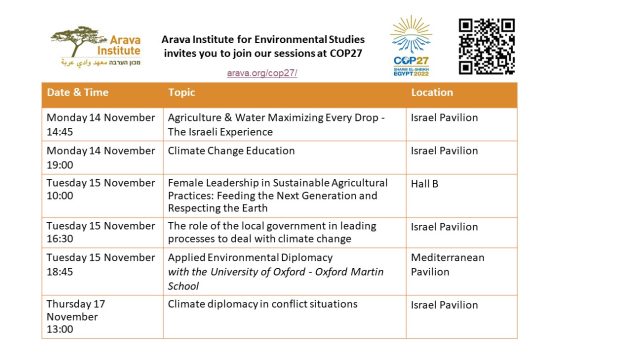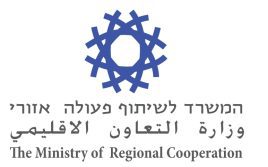
Dr. Clive Lipchin, the head of our Center for Transboundary Water management, joins this panel of short presentations introducing management of water supply for agriculture, technology solutions for minimizing water use and increasing crop productivity, and the experience of Israel with the use of treated recycled wastewater in agriculture.
Participants: Daniel Werner, Prof. Menachem Moshelion, Danny Greenwald, Dr. Clive Lipchin, Ronit Sela
Dr. Tareq Abu Hamed, Executive Director, and Dr. Jessica Schaeckermann, Academic Director of the Institute will present at this event which is hosting two panels on emerging dilemmas in Climate Change Education (CCE). The Ministry of Education and The Ministry of Environmental protection in Israel have recently announced on a program for mandatory K-12 Climate Change Education starting this September. The development and implementation of the program involved partnerships of government, academia, and NGOs. The event will aim at eliciting different points of view on various questions on CCE and allow both specialists and interested parties to share knowledge, experience, and dilemmas.
Panel 1. Where? Direction
- integration of knowledge and competencies, social education and professional development as major principles in Climate Change Education (CCE)
- Knowledge driven vs. Action driven CCE in partnerships
Panel 2. How? Partnerships and communities
- Partnerships of government, academia, professional development specialists, and NGOs for CCE in design, Development and implementation.
- Models of CCE in different communities
Participants: Dr. Gilmor Keshet – Maor, Hagai Gross, Prof. Tali Tal,, Prof. Michal Zion, Prof. Orit Ben Zvi Assaraf, Dr. Hanan Ginat, Dr. Nirit Lavie Alon, Prof. Yuli Tamir, Dr. Tareq Abu Hamed, Dr. Jessica Schackermann, Dr. Oded Kreyman, Einat Kramer, Shachar Bookman
Dr. Rina Kedem, Institute alumna and co-director of our Jordan-Israel Center for Community, Environment and Research, is a part of this discussion with the women leading a new generation of sustainable agricultural practices, exploring the role of the MENA region as a testing ground for regeneration and management of resource scarcity when addressing food security challenges. This engaging discussion will include innovators, investors, farmers, and researchers, who have all demonstrated their commitment to respecting the earth and agriculture as a method of ensuring climate safety for the next generation.
Presenters: Dr. Rina Kedem, Katie Wachsberger, Ghita Bahmad, Mona Rabie, Marie-Elaine Beaudoin, Aya Khourshid
Participants: Mayor of Eilat -Eli Lankri. Mona Massalha , Dr. Rina Kedem, Assaf Admon, Uriel Babczyk
Dr. Rina Kedem, Institute alumna and co-director of our Jordan-Israel Center for Community, Environment and Research, is on this panel in her capacity as an advisor to the city of Eilat on cross-border cooperation.
The activity aims to demonstrate the local government’s role in leading processes to deal with climate change. Since the city of Eilat is closer to Sharm El-Sheikh than Tel Aviv, we see great relevance and a unique opportunity in this activity that strengthens the connection of the city’s decision-makers to regional climate action. The leading environmental projects on climate change and community-regional resilience will be presented during the activity. The two selected projects are “100 Carbon Neutral and Smart Cities by 2030” program of the European Union and an ICZM – Cross-border Integrated Coastal Management program for the Gulf of Aqaba. In addition, there will be presentation on the topic of Mainstreaming Sustainable Energy Transformation in Cities on the National level. In a densely populated and urban country like Israel, the local government has a critical role in achieving the national goals for renewable energy production, energy efficiency, and electric transportation. The presentation will detail the process of building a government strategy to institutionalize sustainable energy in cities and local authorities in Israel and transforming them into central and proactive players in reducing greenhouse gas emissions from the energy sector – capacity building, incentives partnership and policy.
Participants: Mayor of Eilat -Eli Lankri. Mona Massalha , Dr. Rina Kedem, Assaf Admon, Uriel Babczyk
Unique, science-based research and collaborative transboundary cooperation in Israel, Palestine and Jordan has been building discreetly over the past three years under the umbrella of the Oxford University Martin School in partnership with Track II Environmental Forum, launched by the Arava Institute for Environmental Studies. This work is advancing scientific understanding to promote practical cross-border co-operation on natural resources in the lower Jordan River Basin – as well as the Nile Basin. The program is analyzing the interconnections between water, energy, and climate in these regions. It has produced scenarios of future needs and practical options for enhancing regional energy and water security.
Participants: Dr. Debbie Sandler, Prof. Richard Caplan, Dr. Shaddad Attili, Dr. Nurit Gal, Dr. Michael Gilmont, Dr. Tareq Abu Hamed

Participants: Dr. Tareq Abu Hamed, Mona Massalha, Dr. Debbie Sandler-Israel, Prof. Jawad Hasan – PA, Tahani Abu Daqqa – PA, Dr. Michael Gilmont – UK, Prof. Riduan Abid – Morocco, Dr. Suleiman Halasah – Jordan, Dr. David Lehrer, Dr. Oded Keinan, Galit Kenigsberg, Idit Reiter
The following are additional panels being presented by the Oxford Martin School, Oxford University, partners to the Arava Institute in the Track II Environmental Forum:
The panel will engage in collaborative opportunities for Europe, Africa, and the Middle East to promote each other’s 2050 national goals. We will discuss the challenges of regional and global cooperation and its significance for the international efforts to reach a low-carbon economy.
Participants: Sharon Hatzor, Prof. Jim Hall, Lior Schiallat, Vijay Rangarajan, Bouzerkri Razi
Convenor: Egypt COP Presidency
Moderator: Dr. Michael Gilmont
The panel, which includes Oxford’s Dr. Nurit Gal, will discuss regional cooperation’s importance in transitioning to a low-carbon economy. The panel will present success stories of joint regional projects and central platforms for promoting cooperation.


